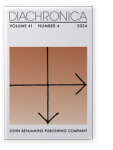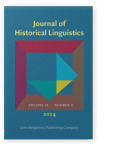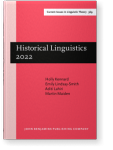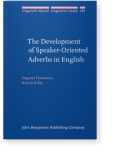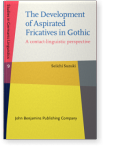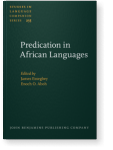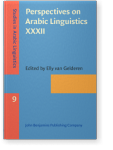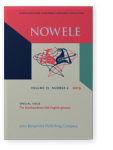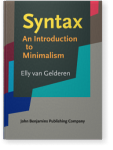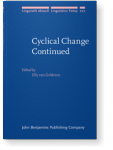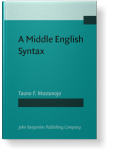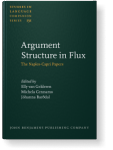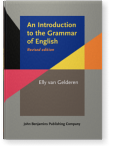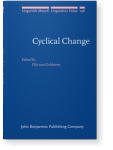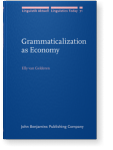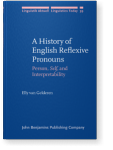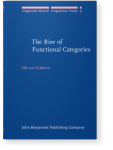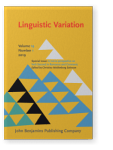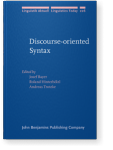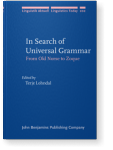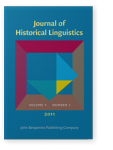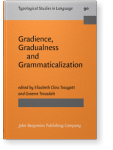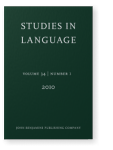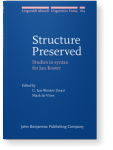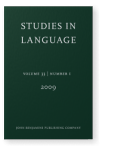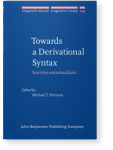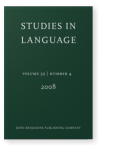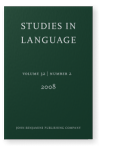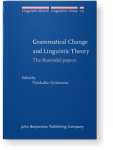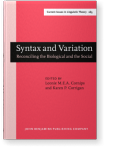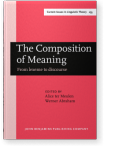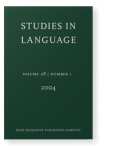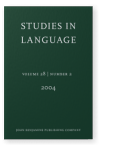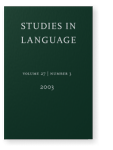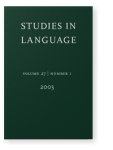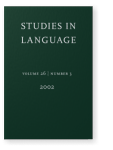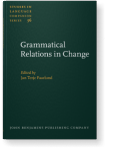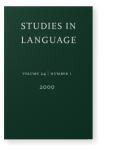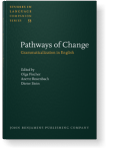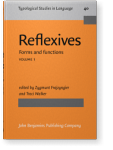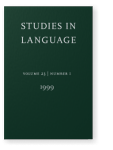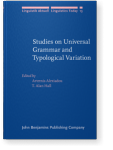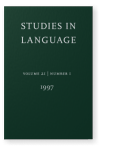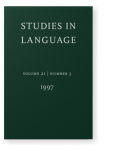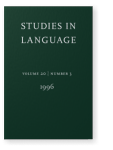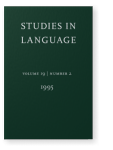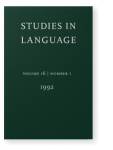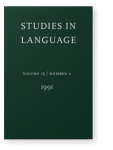Elly van Gelderen
List of John Benjamins publications for which Elly van Gelderen plays a role.
Journals
ISSN 2210-2116 | E-ISSN 2210-2124
Book series
ISSN 2452-2120
Perspectives on Arabic Linguistics XXXII: Papers selected from the Annual Symposium on Arabic Linguistics, Tempe, Arizona, 2018
Edited by Elly van Gelderen
[Studies in Arabic Linguistics, 9] 2020. v, 174 pp.
Subjects Afro-Asiatic languages | Syntax | Theoretical linguistics
The Northumbrian Old English glosses
Edited by Elly van Gelderen
Special issue of NOWELE 72:2 (2019) v, 154 pp.
Subjects Germanic linguistics | Historical linguistics
Subjects Generative linguistics | Syntax | Theoretical linguistics
Cyclical Change Continued
Edited by Elly van Gelderen
[Linguistik Aktuell/Linguistics Today, 227] 2016. viii, 429 pp.
Subjects Historical linguistics | Syntax | Theoretical linguistics
Subjects English linguistics | Germanic linguistics | Historical linguistics
A History of the English Language: Revised edition
Elly van Gelderen
[Not in series, 183] 2014. xx, 338 pp.
Subjects English linguistics | Germanic linguistics | Historical linguistics | Theoretical linguistics
Argument Structure in Flux: The Naples-Capri Papers
Edited by Elly van Gelderen, Jóhanna Barðdal and Michela Cennamo
[Studies in Language Companion Series, 131] 2013. viii, 578 pp.
Subjects Historical linguistics | Semantics | Syntax | Theoretical linguistics
An Introduction to the Grammar of English: Revised edition
Elly van Gelderen
[Not in series, 153] 2010. xxi, 232 pp.
Subjects English linguistics | Germanic linguistics | Theoretical linguistics
Cyclical Change
Edited by Elly van Gelderen
[Linguistik Aktuell/Linguistics Today, 146] 2009. viii, 329 pp.
Subjects Historical linguistics | Syntax | Theoretical linguistics
Subjects English linguistics | Germanic linguistics | Historical linguistics | Theoretical linguistics
Grammaticalization as Economy
Elly van Gelderen
[Linguistik Aktuell/Linguistics Today, 71] 2004. xv, 318 pp.
Subjects English linguistics | Generative linguistics | Germanic linguistics | Historical linguistics | Syntax | Theoretical linguistics
An Introduction to the Grammar of English: Syntactic arguments and socio-historical background
Elly van Gelderen
[Not in series, 111] 2002. xxiv, 200 pp.
Subjects English linguistics | Generative linguistics | Germanic linguistics | Syntax
A History of English Reflexive Pronouns: Person, Self, and Interpretability
Elly van Gelderen
[Linguistik Aktuell/Linguistics Today, 39] 2000. xiv, 277 pp.
Subjects English linguistics | Generative linguistics | Germanic linguistics | Historical linguistics | Morphology | Semantics
The Rise of Functional Categories
Elly van Gelderen
[Linguistik Aktuell/Linguistics Today, 9] 1993. x, 224 pp.
Subjects English linguistics | Generative linguistics | Germanic linguistics | Historical linguistics | Syntax | Theoretical linguistics
2020 Introduction Perspectives on Arabic Linguistics XXXII: Papers selected from the Annual Symposium on Arabic Linguistics, Tempe, Arizona, 2018, Gelderen, Elly van (ed.), pp. 1–8 | Chapter
2019 Main and embedded clausal asymmetry in the history of English: Changes in assertive and non-assertive complements A micro-perspective on Verb Second in Romance and Germanic, Meklenborg Salvesen, Christine (ed.), pp. 118–140 | Article
In this paper, I sketch the CP layer in main and embedded clauses in the history of English. The Modern English main clause is not as easily expandable as the Old English one, but the reverse is true in the subordinate clause, where Modern English has a more flexible embedded CP than Old English. read more
2019 The Northumbrian Old English glosses The Northumbrian Old English glosses, Gelderen, Elly van (ed.), pp. 119–133 | Introduction
The articles in this volume contribute to our understanding of Northumbrian Old English of the 10th century, of the nature of external influence, and of the authorship of the glosses. This introduction provides a background to these three areas. Most of the introduction and contributions examine… read more
2019 Reflexive pronouns in the Lindisfarne glosses The Northumbrian Old English glosses, Gelderen, Elly van (ed.), pp. 220–244 | Article
Old English uses personal pronouns, demonstratives, and limited null subject for reference to previously mentioned nouns. It uses personal pronouns reflexively and pronouns modified by ‘self’ identical in form with an intensive. This use of a pronoun modified by self has been attributed to… read more
2016 The interaction between the French subject and object cycles Cyclical Change Continued, Gelderen, Elly van (ed.), pp. 113–136 | Article
In Colloquial French, first and second person preverbal subject pronouns function as agreement markers on the finite verb because they are obligatory and adjacent to the finite verb (e.g. von Wartburg 1943). In other spoken varieties of French, third person pronouns are also agreement markers,… read more
2016 Introduction A Middle English Syntax: Parts of speech, Mustanoja, Tauno F., pp. vii–ix | Miscellaneous
2016 Cyclical change continued: Introduction Cyclical Change Continued, Gelderen, Elly van (ed.), pp. 3–17 | Article
This introductory chapter outlines what a cycle is, what kinds of cycles are generally accepted, and how the contributions in this book fit the various cycles. Uncontroversial cycles are the negative, future, modal, and determiner cycles; these will be referred to as micro-cycles. More… read more
2015 The particle how Discourse-oriented Syntax, Bayer, Josef, Roland Hinterhölzl and Andreas Trotzke (eds.), pp. 159–174 | Article
Words that function in the lower part of the clause can be reanalyzed as base generated in the higher part. In this paper, I examine how the manner and degree adverb how also functions as a conjunction and yes/no marker. The latter two uses, though not accepted by all native speakers, go back quite… read more
2013 The diachrony of pronouns and demonstratives In Search of Universal Grammar: From Old Norse to Zoque, Lohndal, Terje (ed.), pp. 195–218 | Article
This paper provides a description and account of some of the changes involving the DP, namely anaphoric marking in English (and Scandinavian). I argue that Old English personal pronouns are not deictic/referential but that demonstrative pronouns have this function. This situation reverses itself in… read more
2011 Valency changes in the history of English Journal of Historical Linguistics 1:1, pp. 106–143 | Article
This article examines changes in the valency marking in the history of English. I start with a discussion of the typological literature on measuring basic valency and point out the problems with such an approach. A sample of 18 Old English verbs provides no basic valency pattern for Old English;… read more
2010 Features in reanalysis and grammaticalization Gradience, Gradualness and Grammaticalization, Traugott, Elizabeth Closs and Graeme Trousdale (eds.), pp. 129–147 | Article
This chapter discusses this volume’s contributions by Roberts, De Smet, and Denison because they cover a wide range of explanations of gradience and gradual change. These three approaches can be accounted for in a similar way and I offer an account of gradual change using a Feature Economy… read more
2010 Review of Anderson (2006): Auxiliary Verb Constructions Studies in Language 34:1, pp. 234–238 | Review
2010 Reflexive cartography Structure Preserved: Studies in syntax for Jan Koster, Zwart, Jan-Wouter and Mark de Vries (eds.), pp. 141–148 | Article
2009 Chapter 1. Cyclical change, an introduction Cyclical Change, Gelderen, Elly van (ed.), pp. 1–14 | Article
2009 Review of Anderson (2006): Auxiliary Verb Constructions Studies in Language 33:1, pp. 252–256 | Review
2009 Language change and survive: Feature economy in the numeration Towards a Derivational Syntax: Survive-minimalism, Putnam, Michael T. (ed.), pp. 257–266 | Article
This paper examines what data from language change can tell us about derivations, and in particular the early part of the derivation where lexical items are selected from the lexicon using the Survive mechanism. It is well-known that in changes often referred to as grammaticalization the features… read more
2008 Review of Iyeiri (2005): Aspects of English negation Studies in Language 32:4, pp. 1000–1002 | Review
2008 Review of Anderson (2006): Auxiliary Verb Constructions Studies in Language 32:2, pp. 495–499 | Review
2008 Linguistic cycles and Economy Principle: The role of Universal Grammar in language change Grammatical Change and Linguistic Theory: The Rosendal papers, Eythórsson, Thórhallur (ed.), pp. 245–264 | Article
2005 Principles and parameters in change Syntax and Variation: Reconciling the Biological and the Social, Cornips, Leonie and Karen P. Corrigan (eds.), pp. 179–198 | Article
2004 Aspect, infinitival complements, and evidentials The Composition of Meaning: From lexeme to discourse, Meulen, Alice G.B. ter and Werner Abraham (eds.), pp. 39–68 | Article
2004 Book notice: “Postverbal behavior” by Thomas Wasow Studies in Language 28:2, pp. 473–476 | Miscellaneous
2001 Towards personal subjects in English: Variation in feature interpretability Grammatical Relations in Change, Faarlund, Jan Terje (ed.), pp. 137–157 | Article
The paper examines the well-known change from impersonal to personal subject from the point of view of a slight person split in Old and Early Middle English: third person pronouns remain impersonal longer than first or second person. This split is shown to be linked to the different rates of… read more
2000 Review of Giorgi & Pianesi (1997): Tense and Aspect: From Semantics to Morphosyntax Studies in Language 24:1, pp. 199–204 | Review
2000 The role of person and position in Old English Pathways of Change: Grammaticalization in English, Fischer, Olga, Anette Rosenbach and Dieter Stein (eds.), pp. 187–206 | Article
2000 Bound pronouns and non-local anaphors: The case of Earlier English Reflexives: Forms and functions, Frajzyngier, Zygmunt and Traci Walker (eds.), pp. 187–226 | Article
1999 Review of Van Kemenade & Vincent (1997): Parameters of morphosyntactic change Studies in Language 23:1, pp. 173–183 | Review
1997 Universals and Minimalist Features Studies on Universal Grammar and Typological Variation, Alexiadou, Artemis and Tracy Alan Hall (eds.), pp. 181–196 | Article
1997 Review of Kastovsky (1994): Studies in Early Modern English Studies in Language 21:1, pp. 174–178 | Review
1997 Review of Battye & Roberts (1995): Clause Structure and Language Change Studies in Language 21:3, pp. 655–667 | Review
1996 The English Language: A Historical Introduction, by Charles Barber Studies in Language 20:3, pp. 719–720 | Squib
1996 Synchronic and Diachronic Approaches to Language: A Festschrift for Toshio Nakao on the Occasion of his sixtieth Birthday, S. Chiba, Y. Fujiwara, M. Ike-uchi, T. Kohno, O. Koma, Y, Nagahara, T. Namiki, Y. Otsu, M. Suiko, K. Ushie and N. Yamada (eds). Studies in Language 20:3, pp. 721–724 | Squib
1995 David Denison, English Historical Syntax Studies in Language 19:2, pp. 575–577 | Squib
